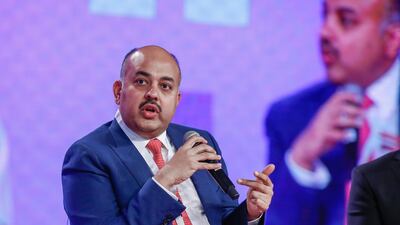The UAE's NMC Health is expanding in Saudi Arabia with a deal that will make it the second-largest non-state healthcare provider in the kingdom, even as it eyes growth opportunities in Egypt.
The London-listed company signed a non-binding agreement with a unit of Saudi Arabia's biggest pension fund to form a joint venture that will provide healthcare facilities in Riyadh and secondary cities, NMC Health said in a statement on Monday. NMC will own a majority stake in the new healthcare company.
“This is a milestone joint venture for NMC,” Prasanth Manghat, chief executive of NMC Health, said in a phone interview. “NMC grew from 600 beds to the second-largest healthcare provider in Saudi without paying cash.”
NMC Health has focused on the GCC, particularly the UAE, Saudi and Oman, for its expansion. Rising demand for healthcare services in Saudi Arabia and government initiatives to boost public-private partnerships are set to create significant investment opportunities in the country, Knight Frank said in a report last month. The kingdom's 2020 National Transformation Plan has set out targets for the healthcare sector, including increasing private healthcare spend from 25 per cent to 35 per cent of the total healthcare expenditure.
The joint venture between NMC and Hassana Investment Company, a unit of the General Organisation for Social Insurance (GOSI), will see NMC hold a minimum stake of 51 per cent and operational management control of the assets, Mr Manghat said. The exact size of the stake will be determined when the final terms are set.
_______________
Read more:
Moody’s assigns Ba1 rating to NMC Healthcare
UAE healthcare firm NMC raises $2bn
_______________
The new platform will be formed through NMC contributing its Saudi assets of 664 hospital beds and Gosi transferring its 39 per cent stake in the Tadawul-listed National Medical Care Company (Care) into the new company. Gosi’s shares in Care will be swapped at 70 Saudi riyals (Dh68.56) and it will continue to own a significant indirect stake in Care through this proposed joint venture, the statement added.
“We are not paying any cash for this, it’s a pure asset swap,” Mr Manghat said.
The company, which will have a capacity of 1,489 beds, will operate in the kingdom's biggest healthcare market Riyadh and cities including Jeddah, Khobar, Hael and Najran, he said. NMC will become the second-biggest non-state healthcare provider in the kingdom after the Dr Sulaiman Al Habib Medical Group, he added.
"The JV platform would be well-positioned to become one of the most dominant healthcare players in Saudi Arabia and is ideally positioned to capitalise on the health care privatisation programme in Saudi Arabia in line with the country's Vision 2030 initiatives," Saad Al Fadly, chief executive of Hassana, said in a statement.
The proposed joint venture drives future expansion for NMC in Saudi Arabia where it will seek to take majority and minority stakes in Saudi-based healthcare operators, according to the statement. It will also acquire operation and management contracts to oversee private and government hospitals in the kingdom.
“The JV will create immense opportunities in the medium to long-term” Mr Manghat said, declining to reveal potential stake purchases.
The joint venture is pending regulatory approvals and signing definitive agreements after both parties complete the necessary due diligence.
NMC is also eyeing growth in the Arab world’s most populous country Egypt, where it has 800 beds, but still needs to study the market.
“It is a very interesting market and is fundamentally strong,” Mr Manghat said. “Once we understand the market, and we believe it’s a good market, we will definitely look at opportunities in Egypt.”


